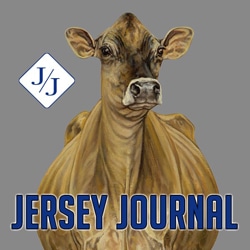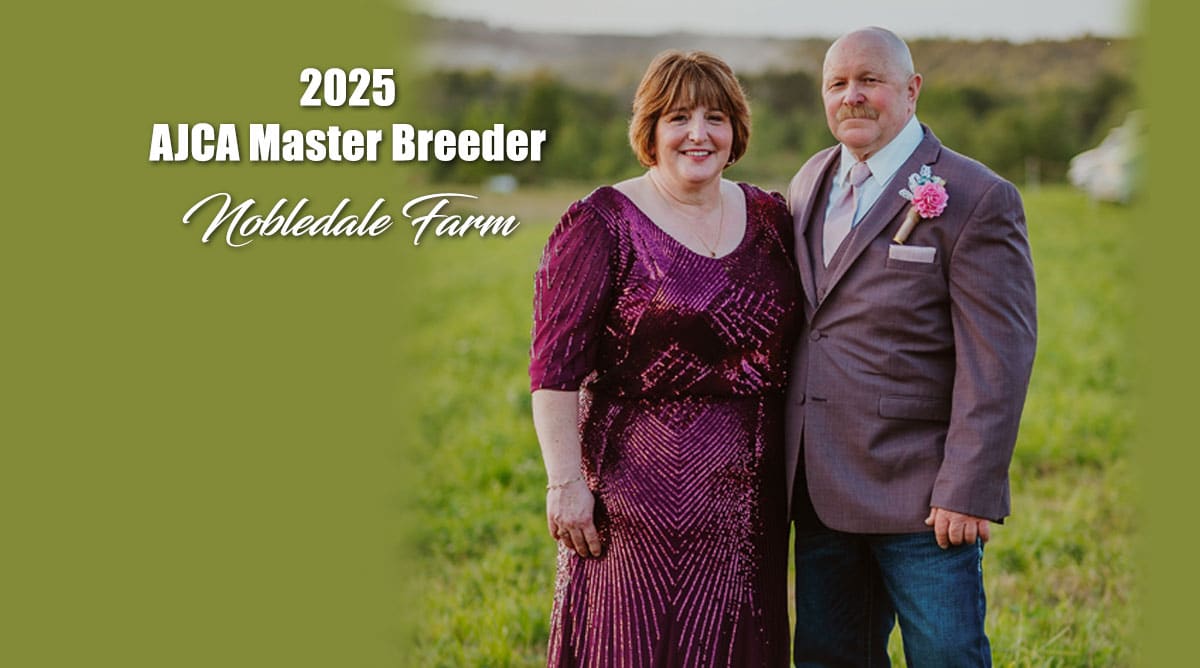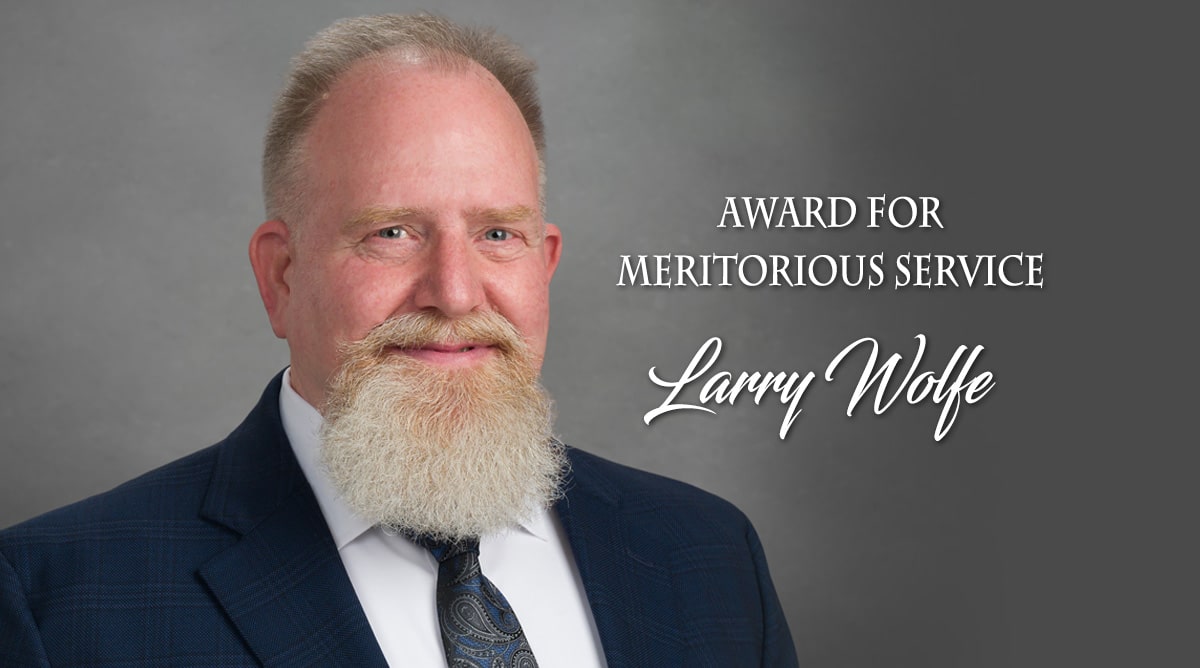Nobledale Farm Named 2025 Master Breeder
Stuart and Elaine Noble, Gillett, Pa., have been named recipients of the Master Breeder award from the American Jersey Cattle Association (AJCA).
The Master Breeder award is bestowed annually to a living AJCA member, family, partnership, or corporation that, in the opinion of the Board of Directors, has bred outstanding animals for many years and thereby made a notable contribution to the advancement of the Jersey breed in the United States.
Stuart and Elaine and their grown children, Wesley and Maria Noble-Ellsworth own and operate Nobledale Farm. Though the couple’s youngest son, Cory, pursued a career off the farm, he lends a hand with the crops as his schedule allows.
The reference to “many years” feels like an understatement at Nobledale Farms, where outstanding animals have been bred for more than 135 years by eight generations of the Noble family.
To put this longevity into perspective: when the Nobles began breeding Registered Jerseys in 1888, Benjamin Harrison was president, the Kodak camera had just debuted, the ballpoint pen was freshly patented, and the Statue of Liberty had only been welcoming the tired, poor and huddled masses for two years.
In the Jersey world, the American Jersey Cattle Club, then based in New York City, was just 20 years beyond its founding and 17 from publication of Volume 1 of the Herd Register. In 1888, the club published its first volume of Butterfat Tests of Registered Jersey Cows.
That same year, George Noble and his son, Alonzo, purchased the family’s first Registered Jersey and brought her home to the farm that had been established by the elder’s father, Alonzo C. Noble, in 1933. Over the years, the family has adopted many progressive herd management practices. Early on, this included registration, production testing and appraisal. This was followed by young sires and embryo transfer, and, most recently, genomic testing and sexed and beef semen. Nobledale Farm has been enrolled on REAP since it was launched in 1995 and been a contract advertiser with the Jersey Journal since 1998.
In the ‘50s and ‘60s, the breeding program took on greater significance when fifth-generation LaVere Noble was at the helm. As a sire analyst for Northeast Breeders Association, he traveled around the country to procure bulls and acquire foundation animals for the farm. Among the most influential was Trippys Sparkling Vinda, the great-grandam of Milkboy Empire Vertus, Stuart’s first 4-H project, and in the lineage of the most impactful cow bred by the family, Nobledale Juno Vermont.
To build on these genetics, LaVere and his son, Tom, prioritized components and longevity when choosing service sires. In those days, the tank held semen from bulls like Observer Chocolate Soldier, Milestones Generator, Quicksilvers Magic of Ogston, and A-Nine Top Brass. During the ‘70s and ‘80s, they also began using young sires to speed genetic progress and get early daughters of promising, unproven bulls.
Tom Noble also had a passion for seeing Jerseys—including those bearing the Nobledale prefix—thrive in other herds. Fondly known as “Mister Jersey,” he was the local contact for Jersey cattle and Jersey knowledge. He played a key role in establishing many Jersey herds and often sold some of his best to youth for 4-H and FFA projects. Nobledale Farm once placed second for the breeder banner at the Tioga County Fair without exhibiting a single animal.
With Tom’s untimely death in 1988, his sons, Stuart and Stephen, took on greater roles at the farm. In 1993, they established a partnership with their mother, Shirley. Stuart focused on the breeding program and herd management, Stephen headed up the crops and feed program and Shirley handled the farm books.
Though the herd had been closed for years, the Nobles began introducing high-end genetics with purchases from elite dispersals and sales like the National Heifer Sale and the All American Jersey Sale. In the breeding program, Stuart began pairing superior production with the long-standing emphasis on components and longevity. Bulls in the lineup now included the likes of Duncan Chief, Mason Boomer Sooner Berretta, J.S. Quicksilver Royal and Yankee FW Chief, along with type bulls from Canada. By alternating American-bred production sires with Canadian-bred conformation sires, he developed cows that were well-rounded, structurally sound and productive.
Stuart also became involved with AJCA’s regional young sire proving group, Liberty Jersey Sires Inc., serving several years as a director. During the ‘90s and early 2000s, about 25% of the herd was bred to young sires. More recently, the Nobles have launched an in-vitro/embryo transfer program and use both sexed dairy and beef semen. The top half of the herd and brood cow families are bred using sexed semen for two services and conventional semen thereafter. The bottom half is used as recipients or bred to beef bulls to produce black calves.
Though the breeding tools have changed over the past century, the Nobles’ goals have not. Income over feed costs remains a priority, along with longevity in genetics. It is protocol to give two-year-olds a chance to develop regardless of performance in the first lactation. The Nobles believe a lot of feed and energy is directed towards growth and maturity in milking heifers, not just putting milk in the bucket.
When Stephen became ill in 2020 and passed in 2022, Maria stepped up and began working full-time on the farm. Three years later, Wesley returned after a four-year hiatus working for other dairy producers, ST Genetics and the animal health company AHV. Elaine works full-time as a 4-H educator in neighboring Chemung County, New York, but also milks cows, cares for newborns and handles office duties. Maria’s husband, Ryan, a heavy equipment operator by trade, helps with herd care, equipment maintenance and crop work.
In fall and winter, cows are fed a total mixed ration (TMR) of haylage, corn silage and grain concentrate along with some dry hay and baleage. During the spring and summer, they are rotationally grazed and brought inside during the hottest part of the day, where the ration is supplemented with the TMR. Plans are underway to construct a freestall barn and retrofit the existing barn into a flat barn parlor. This expansion will improve cow comfort and allow the Nobles to raise more replacement heifers, as 15-20% are currently sold each year as dairy replacements due to space constraints.
The 84-cow herd has a March 2025 actual rolling herd average of 17,616 lbs. milk, 860 lbs. fat and 658 lbs. protein. With the January 2025 appraisal, the herd includes 38 Excellent and 45 Very Good cows and has an average final score of 87.8%.
The “V” cow family perfectly illustrates how the Nobles combined association programs, strategic matings and breed-leading sires to steadily improve their herd—and reap the rewards. In 1975, Stuart’s “Vertus” received a modest final score of 62% from the classifier. It was a humble start, but with each generation, both scores and production improved: Very Good-80%, then Very Good-82%, and then Excellent-91% with Nobledale Magic Velvet, who completed a dozen lactations and lived to the age of 17.
Three generations later came “Vermont,” born in June 1992, two months after Stuart and Elaine wed, and named for their honeymoon destination. In 1995, she placed second at the Mid-Atlantic Regional Jersey Show, a strong enough showing to justify a trip to the All American Jersey Show, a first for the Nobles. She drew interest and pricing inquiries in Louisville, but the Nobles had big plans for her, so she stayed in Pennsylvania.
“Vermont” was one of those young cows that needed time to develop. She produced 12,000 lbs. of milk in her first lactation and 17,000 in her second. By her third lactation, she was giving more than 100 lbs. a day and completed the first of three consecutive lactations over 20,000 lbs. milk.
She launched the flush program at Nobledale Farm and became the farm’s first Excellent-94% cow in 1998, earning 50 points in stature and strength and 49 in rump width.
Sired by Valleystream J I S Juno—a bull not known for production—she initially posed challenges for merchandising. She proved her ability to transmit desirable genetics, however, and ultimately produced 59 offspring. Of these, 15 bulls were sampled in A.I. and 15 females were sold at elite consignment sales.
Her most notable daughter, Nobledale Pitino Victoria, was the high seller at the 2002 All American Jersey Sale, purchased by Goff Dairy, Hobbs, N.M., as a three-year-old. She was flushed at both Nobledale Farm and Goff Dairy and has 54 registered progeny. Like her mother, she was appraised Excellent-94% and made a record over 21,000 lbs. milk. Another daughter, Nobledale Victorias Sydney-ET, Excellent-90%, sold to David and Diana Freeman, Greenville, Ill., who successfully marketed her genetics and sent sons to A.I.
Of the 165 females that reside at Nobledale Farm today, more than half are direct maternal descendants of “Vermont.”
“Vermont” is on the paternal side of some as well, including the branch of the “B” family that traces to Nobledale Homestead Brenda, Excellent-92%, a matriarch who was still in the milking string at 18 years of age. In her ninth lactation, she was bred to Nobledale Barkly Vodka-ET, a herd bull out of “Vermont,” and gave birth to Nobledale Vodka Bernadette, Very Good-88%. Her daughter, Nobledale Action Bella, is the Nobles’ highest appraised cow at Excellent-95%. A family favorite, she was shown by both Wesley and Maria and was flushed several times. She has eight registered progeny to date, several pregnancies due this spring and embryos in the tank. She celebrated her 14th birthday in October and is living out the remainder of her life as a dry cow.
Also hailing from this family is Nobledale Fizz Bubbly, Excellent-91%, a granddaughter of “Bernadette,” who was shown in the 2019 National Jersey Jug Futurity, another first for the family.
Over the past 135 years, Nobledale Farm has celebrated many firsts and set new standards. But the journey is far from over. As Stuart and Elaine begin to step back from their roles, they are transitioning the farm to Wesley and Maria. The herd is in good hands as both are as passionate about the cows as their predecessors. Wesley has participated in youth programs and breeds cattle using the Noble Oaks prefix. Maria attended Jersey Youth Academy in 2011, was National Jersey Queen in 2016 and earned the AJCA Young Jersey Breeder award in 2024. There are promising signs for the ninth generation, as Ryan and Maria’s 18-month-old daughter, Isabella, is already showing an affinity for brown cows.




